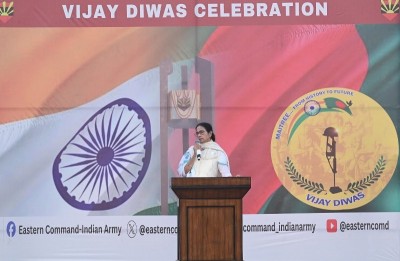 World Vision India
World Vision India
World Vision India presents the 2020 Child Well-Being Index
Kolkata: World Vision India released on Tuesday the second edition of the India Child Well-Being Report.
This report provides data on various child-centric indicators and analyses them through nine dimensions namely- life, bodily health, bodily integrity, senses, imagination, thoughts, emotions, practical reasons, affiliation, play and control over one’s environment.
The report also maps the data comparison across different regions, states and districts.
Releasing the report, Krishnamurthy. V. Subramanian Chief Economic Advisor – Government of India in his keynote address said, “Our government is fully committed towards securing the rights and well-being of children. Economies grow when child development is a priority. Tracking districts data with a set of real-time indicators will promote healthy competition and encourage each district to achieve the set mandate. I congratulate World Vision India for initiating this discussion using government data.”
Technical partners for the ‘India Child Well-being Report 2020’, include Pathfinder International India, OP Jindal School of Banking and Finance, Poverty Learning Foundation and the University of Melbourne.
Speaking at the report release, Madhav Bellamkonda, National Director and CEO, World Vision India said, “Investments in early childhood development are pertinent for a better tomorrow for our children, especially at a time where uncertainty has intensified around us. Child Well-Being is an important conversation in the development sector and it is critical that we understand it in a holistic manner. We are confident that this report will serve as a guide for policymakers, practitioners and civil societies to understand Child Well-Being and develop child friendly policies.”
The report was released in the presence of Nayan Chakravarty, Director, Pathfinder International India, Amlan Gupta, Associate Professor & Assistant Dean (Research), OP Jindal Global University, Piyush Tiwari, Professor in Property, Faculty of Architecture, Building and Planning, University of Melbourne and Vijay Kumar, CEO, Poverty Learning Foundation.
This report has adopted Nussbaum’s capability approach to measure Child Well-Being in India. Using capabilities identified by Nussbaum, an index was constructed to define and capture the multidimensionality of Child Well-Being.
The Child Well-Being Index is a tool designed to measure and track children’s well-being comprehensively. The Child Well-Being approach puts the quality of life and happiness of the child at the forefront and aims at increasing the capabilities of the child in accordance with the basic indicators in each domain.
The report captures a region-wise analysis in terms of the Child Well-Being index across 640 districts in 28 states and 9 union territories using 99 indicators.
Support Our Journalism
We cannot do without you.. your contribution supports unbiased journalism
IBNS is not driven by any ism- not wokeism, not racism, not skewed secularism, not hyper right-wing or left liberal ideals, nor by any hardline religious beliefs or hyper nationalism. We want to serve you good old objective news, as they are. We do not judge or preach. We let people decide for themselves. We only try to present factual and well-sourced news.







